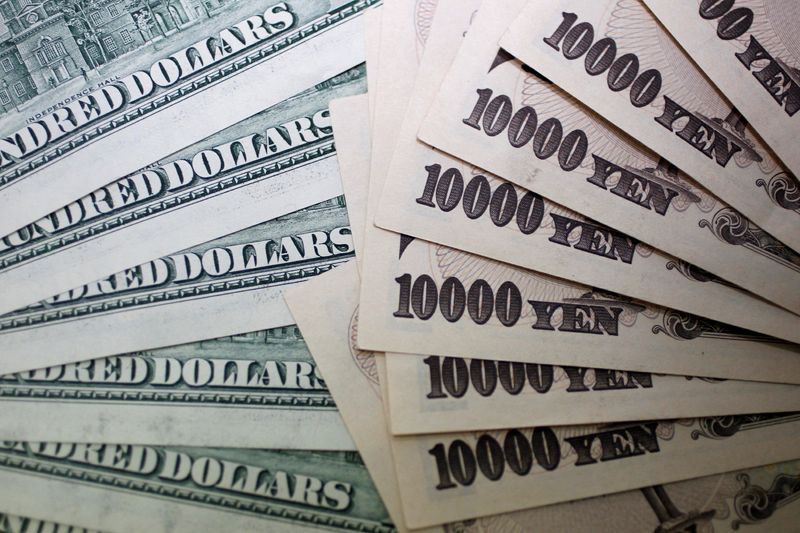By Kevin Buckland
TOKYO (Reuters) -The U.S. dollar traded close to a three-month high against major peers on Thursday, underpinned by expectations for a slower pace of interest rate cuts by the Federal Reserve and growing bets of a possible second Donald Trump presidency.
The dollar index, which measures the currency against six rivals including the euro and yen, stood at 104.30 as of 0437 GMT, not far from the overnight high of 104.57, a level last seen on July 30.
A spate of robust macroeconomic indicators and some hawkish comments from Fed officials have tempered bets for monetary easing over the rest of this year, according to CME Group's (NASDAQ:CME) FedWatch Tool.
Expectations for a total of 50 basis points of rate reductions over the remaining two meetings of 2024 dropped to about 66% from about 70% a day earlier, and about 86% a week ago. Traders currently lay 32% odds on a single 25 basis-point cut by year-end, and 2% odds on no change.
This week, Kansas City Fed President Jeffrey Schmid said he would prefer to "avoid outsized moves", and Philadelphia Fed President Patrick Harker backed "a slow, methodical approach" to further easing.
U.S. 10-year Treasury yields have risen in response, reaching a three-month high of 4.26% overnight.
The Japanese yen tends to weaken when U.S. bonds yields climb, and the dollar pushed as high as 153.19 yen on Wednesday for the first time since July 31.
The yen got some respite in Thursday's session after Japan's finance minister said officials "are watching exchange-rate moves with heightened vigilance", invoking the risk of intervention. The Japanese currency was last changing hands at 152.17 per dollar.
Japan's coalition government - under new Prime Minister Shigeru Ishiba - is at risk of losing its majority parliament in Sunday's election, recent polls show, and any rise in political uncertainty would further complicate the Bank of Japan's plans for monetary policy normalisation.
BOJ Governor Kazuo Ueda said overnight it was "still taking time" to sustainably achieve the central bank's 2% inflation target, and signaled that rate hikes would be done "cautiously and gradually". But he also warned of the cost of moving too slowly, which could encourage speculators to push the yen lower.
The central bank's next policy decision is on Oct. 31, and it is widely expected to stand pat this time.
"USD is the king of currencies given market expectations for the Fed to hold policy rates higher than previously expected and the pricing in of Trump 2.0," said Shoki Omori, chief Japan desk strategist at Mizuho Securities, adding the dollar could eventually test the 160 yen level.
"The Ishiba administration would need to stop USD/JPY going higher with speed, but I don't think either MOF (Ministry of Finance) or the cabinet would want to actually intervene," Omori said. "Higher import prices for raw materials and food wouldn't be good for his approval rating."
The dollar has also benefited from a recent rise in market expectations for a victory next month by Republican candidate and former President Trump, which would likely bring about inflationary policies such as tariffs.
Although opinion polls indicate a neck-and-neck race with Democratic rival, Vice President Kamala Harris, cryptocurrency-prediction exchange Polymarket has seen a sharp increase in bets for a Trump win.
That has helped stoke a spike in FX volatily, said Commonwealth Bank of Australia currency strategist Carol Kong, with Deutsche Bank (ETR:DBKGn)'s gauge of implied currency swings jumping to a three-week high on Wednesday.
"We consider FX implied volatility can keep rising in the lead-up to and even after election day because we see a high risk the losing candidate disputes the election," Kong said.
"At present, the currency markets are likely positioned for a victory by President Trump," she said. "However, the election outcome remains highly uncertain."
The euro slumped to a nearly four-month trough of $1.07612 overnight, and last changed hands at $1.079075.
Traders have ramped up bets on faster and potentially bigger rate cuts from the European Central Bank after a host of policymakers warned about the risk of undershooting the central bank's 2% inflation target - a remarkable change in tone after a two-year campaign to rein in prices.

On Wednesday, ECB President Christine Lagarde took a more measured stance, saying policymakers need to be "cautious" in deciding policy, although colleague Mario Centeno suggested rates could be cut by 50 basis points at the monetary authority's next meeting on Dec. 12.
Sterling was steady at $1.29255, after dipping to a more than five-week low of $1.29080 in the previous session.